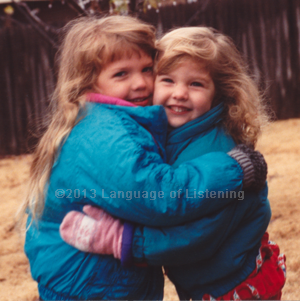In response to our post, Teasing & Name-calling, Amerin (children 7, 9, 11) asked a question that may have come up for you, too.
We are so glad she asked, because it’s normal to hit growth points like this when you are committed to mastering Language of Listening® to create deeper connections and more supportive relationships with your children, and weren’t raised that way yourself.
Question:
“So, help me respond to my kids when one of mine is calling the other sibling a name. They (the name caller) is usually angry or frustrated. How can I get the name calling to stop?
I can imagine the conversation of, “You’re really angry, and we don’t call people names.” And the name calling will continue.
Help me with what I can do next. Should I and the child being called a name leave the room? I have tried to get the other one to step away until they are calm but they don’t want to step away?
Then should I follow up with a separate conversation when they are calm about name calling? Do I follow up with anything else? Consequence? I think we have tried usually an apology to the person, verbal or written. But still we have the name calling.
Perhaps I need to just keep on… Or any other techniques you can suggest to try?”
Answer:
It’s frustrating when you want to get your kids to stop doing something and can’t, especially when you’ve tried to SAY WHAT YOU SEE first. You are saying how he feels, which is the right place to start. It’s also the place to stay… much longer until he feels like you understand why he is right to feel angry.
In the example I described in the Teasing & Name-calling post, I took the name-calling child aside. At home, you could simply step in between him and his brother, listen and SAY WHAT YOU SEE with the intention of understanding why a great kid like him would do that, the way I did in my example in that post.
Do not try to stop the name-calling; he will do that himself when he is heard.
It might sound like this:
SWYS: (matching his frustration level with your voice) “There’s that name-calling again! You are sooo angry! Something happened, and you want him to know it is really NOT OK with you!”
Then listen and respond as he tells you what happened. If he leans out and shoots another name by you while you are listening, contain your impulse to stop him. This is not a teaching moment. Just continue to SAY WHAT YOU SEE until he is completely heard:
SWYS: “There it is again! You know that’s not OK with me, and that name still came out anyway. Wow! You must really want to get back at him! You probably think that if you hurt him enough, then he would do what you want (OR “then he would stop that,” etc.).”
If that is correct and getting his brother to do something (or stop doing something) is actually his goal, he may be caught in the same trap you are when you feel like you have to control his behavior and can’t. Problem-solving with CAN DOs can give you both a way out.
So when you finally get a big nod from him that says, “Now you understand,” the name-calling will stop and you can go on:
SWYS: “So you want him to do something, and you can’t get him to. Hmm. Name-calling doesn’t seem to be working—he’s still not doing it.”
CAN DO: “Must be something else you can do!”
If he still feels defensive, he may say, “Yes, it does!” Continue to make him right by saying:
SWYS: “Oh, that’s right! It does work. It works to make you feel a little bit better and maybe more powerful. Hmmm. I don’t see him doing what you want, though. It might even make it harder for him to want to.”
At this point turn and check with his brother. If his brother says something like, “Yeah. I just get angrier and don’t want to do what you want even more,” you can ask the brother what would work better for him. Then stay and mediate by checking with each child while they go back and forth until they come up with a solution that works for them both, or they just go their separate ways.
If they actually reach an agreement, point out the STRENGTHs depending on what you see:
STRENGTH: “You two worked that out together,” or “You actually care what each other wants,” or “Looks like you two like getting along much better than fighting,” etc.
At bedtime, you can talk to the name-calling son about how he really feels about name calling. To get on the same side with him, you might say something like:
SWYS: “It doesn’t look like you enjoy calling your brother names. Normally you get along pretty well. I only hear name-calling when you feel like nothing else works. I’ll try to remember that’s what it means and help you when you feel stuck instead of getting angry. Tell me what you want me to do…”
A conversation like that would put you on his side, and put him in the lead on how he can best change his own behavior for the only reason that works:
Because he wants to!
Once he feels better about himself, you can start to have discussions with both boys together over name calling (or other matters like this), so they can hear how the other feels about it and come to understand why great kids like them would do what they do. The goal is to get the family all on the same side in support of each other.
So the short answer to your question is this:
You cannot get your son to stop name-calling; only he can do that. Shifting your focus from his behavior to why he is doing it might be the missing piece for you.











